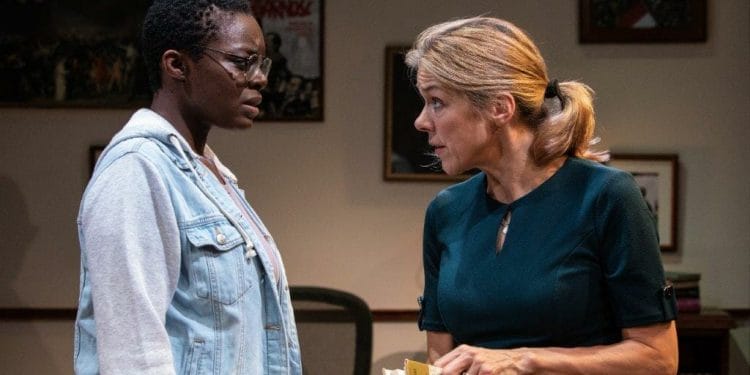 Making its European premiere, the ironically titled The Niceties by Eleanor Burgess comes to the Finborough Theatre under the direction of Matthew Iliffe. This nippy two hander about race bias in an expensive American school takes a magnifying glass to the intricacies of saying and doing the right thing.
Making its European premiere, the ironically titled The Niceties by Eleanor Burgess comes to the Finborough Theatre under the direction of Matthew Iliffe. This nippy two hander about race bias in an expensive American school takes a magnifying glass to the intricacies of saying and doing the right thing.
We’ve had a similar kind of play in London this year with Joshua Harman’s Admissions; it too was set in an elite American university, and tackled issues of race bias, but in the areas that play failed to deliver, The Niceties positively excels.
Zoe Reed has handed in her essay early to tenured professor Janine Bosko in the hope of getting an early assessment of what her grade might be. The conversation begins as a convivial exchange of ideas, but Janine’s dismissiveness to Zoe’s topic begins to rile the young black student who wants to write about slavery in the American revolution.
The setting is Janine’s office, and with George Washington looking down upon them from the white wall, the professor becomes less guarded in what she has to say. Zoe occasionally plays with her phone, much to her teacher’s annoyance, but that irritation turns to rage when Janine discovers the conversation has been recorded.
Burgess’s writing is superbly razor sharp, like a particularly fervent game of tennis the dialogue bounces back and forth at a merciless pace. Janine doesn’t believe herself to be a racist, indeed she often appears to empathise with Zoe, but her race bias become more and more obvious. Zoe comes across as all the worst traits of Gen Z wrapped up in to one human embodiment, her points are more than valid but her delivery is aggressive and self-entitled.
So, as an audience we bounce back in forth in this debate, weighing up the arguments as they are presented. Neither character is implicitly wrong in what they have to say, but neither are they right, and so the tense stand-off that occurs between the two bleeds out in to the audience leaving us marred by every exchange.
Matthew Iliffe has created a very believable interaction between the two, Janine begins by confidently lecturing Zoe on the correct use of grammar and sentence structure, but by the end of the play the character is so worried about saying the wrong thing she is tripping over her words and editing herself as she goes. Janie Dee’s talent shines through here, and in the second act Dee presents an almost entirely different character, one who has been through a very public battle with her own shortcomings.
In her stage debut Moronkẹ Akinola gives a captivating performance as Zoe, just like her professor we find ourselves both empathetic and infuriated by her behaviour. Akinola makes Zoe a confident and intriguing character that keeps pace with her more experienced sparring partner.
The Niceties is set at the end of the Obama administration, and as Janine drinks tea from a Hilary Clinton mug there’s a sense that more positivity lies ahead, with the benefit of hindsight we can see how the pair could have been a force for good in the Trump years, if only they had been prepared to give way a little.
At times Janine shares with Zoe her own battles and struggles, but Zoe dismisses these as unimportant compared to her own, it leaves us wondering if centuries of oppression gives someone the right to reject the oppression of other groups. The Niceties is a fascinating study of human behaviour that doesn’t give us any easy answers.























